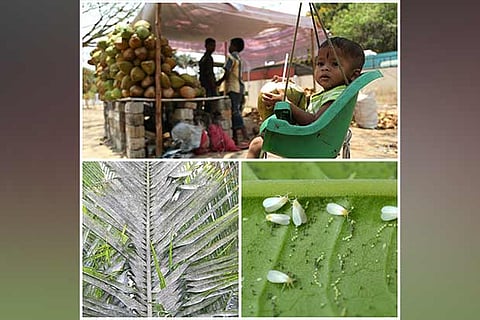

Coimbatore
Farmers, who attribute the same to a pest attack (whiteflies) in their plantations, say the yield of tender coconuts has come down by more than 25 per cent.
Farmers had opted for hybrid varieties in recent years as they have a much bigger sized-nut, besides yielding coconuts with a large water content. However, Dhanabal Muthusamy, Director, Anaimalai coconut producers company said it is now rare to find chowghat orange dwarf (sevelani) variety of coconut trees. “This particular variety, which yield only tender coconuts, has suffered the maximum damage due to the infestation of whiteflies,” he said.“Two others hybrid varieties, namely ‘DJ’ and ‘Ram Ganga’,have also been affected. However, the tall and native coconut trees have managed to survive the pest attack due to their high resistance capacity,” said Muthusamy.
Good rains last year during the southwest monsoon helped the rejuvenation of coconut farms, which previously suffered under drought conditions. But, the farmers are now worried due to the infestation of whiteflies, a bug which is native to the central American region.
Due to the shortfall in production, there is a huge mismatch in demand and supply of tender coconuts. It may be noted that production was already hit in the Cyclone Gaja-hit delta districts. Lakhs of coconut trees got uprooted in major coconut producing districts like Pattukottai, Peravurani and Aranthangi in the delta region.
“I got a yield of 1.3 lakh tender coconuts in my 55-acre farm by the first week of March last year. This year, the yield has come down to a mere 12,000 due to the whitefly menace,” said P Appukutty, president of Tamil Nadu tender coconut growers’ association.
“With increasing demand, the selling price of tender coconuts by farmers hovers around Rs 22-30 now depending on the size of the nuts. They were sold by farmers for Rs 15 during the same period last year. Prices may go up further in the coming days as tender coconut supply from farms is also coming down gradually,” said K Padmanaban, chairman,Vinayaga coconut producers’ company, adding that tender coconuts may become a scarce commodity soon if urgent measures are not taken to handle the problem of whiteflies.
Criticising the State government for not taking any concerted efforts in this regard, Appukutty said, “We have failed in all our efforts to eradicate the fly, which continue to multiply and grow in numbers. Even the natural predator bugs suggested by scientists has not provided any relief to us.”
HEALTH DRINK AT RISK
Outbreak may be due to use of chemicals: Expert
The Coconut Research Station in Aliyar has developed five well-defined integrated pest management strategies to control the flies. Commonly called the Rugose Spirally Whitefly, the pest affects the cultivation of papaya, sapota, guava, sorghum and maize.
According to K Rajamanickam, Professor- Agricultural Entomology, Coconut Research Station, Tamil Nadu Agricultural University (TNAU), Aliyar, the release of encarsia parasitoid, chryosopa predator insects and spraying of bio-fertilizers will help to control the white flies. Other measures to attract and kill the flies include using yellow light traps (night time) and suspending yellow sticky traps from a tree (day time).
Suggesting that farmers should refrain from using chemicals as it would kill natural insects along with the pests, he said that the sudden outbreak of whiteflies now could be due to rampant use of chemical fertilizers by farmers without consulting experts.
“Also, ecological conditions, which could be a sudden increase or dip in temperature, unexpected rains and changing humidity, may have an impact on pests. Farmers are also reluctant in implementing scientific strategies to control the whiteflies. If one farmer implements control measures and a neighbouring farmer doesn’t do the same, it would not give the desired results as the pest would continue to spread,” he said, adding that regular awareness programmes were being held for farmers.
For any further information regarding the control of whiteflies, farmers can contact the Aliyar Coconut Research Station (04253-288755), Rajamanickam added.
Visit news.dtnext.in to explore our interactive epaper!
Download the DT Next app for more exciting features!
Click here for iOS
Click here for Android